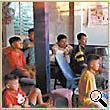Children under
Dr. Cynthia's care...
Generations of Burmese
people have known war...

Two boys separated
from their villages...
CYNTHIA MAUNG HAD NOT MEANT to get involved in war. In 1988, she was a village doctor in a private clinic far from the action, and like young doctors all over the world, she was busy earning money to pay off her debts. She knew little about democracy, politics or human rights. Her homeland had big problems, but what could she do?
Men had fought to control Burma for more than 1,000 years. First were tribes from India and China, Tibet and Siam. Then came European missionaries, the British, the Japanese and the British again, this time promising independence.
On the eve of independence in 1947, hired guns assassinated Burma's elected leaders, including national hero Gen. Aung San. Burma slid into economic and political depression punctuated by ethnic rebellions and capped by a 1962 coup d'état.
Gen. Ne Win, leader of the coup, isolated and bankrupted Burma. His government banned virtually all foreign contact, randomly eliminated bank notes, arrested and tortured thousands. Burma became one of the world's poorest nations -- a top heroin exporter, yet unable to feed its own people.
In 1988, frustration boiled over. Tens of thousands of civilians demonstrated; soldiers shot at them, killing more than 2,000. Aung San Suu Kyi, daughter of martyred hero Aung San, exhorted crowds to have courage, to believe in a society free from want and fear. Her party won 82 percent of the vote in a 1990 election. The state ignored the people and placed her under house arrest.
Students' speeches about freedom and forced labor drifted through the open windows of Dr. Cynthia's clinic, but she barely paid attention. Tuberculosis was spreading through the village; her patients had no money for the expensive medicine. Her mother was dying of liver failure.
"We follow the flow, the stream, just thinking about tomorrow," she recalled. "What do I need, how can I get the money. Not much time for thinking of other people."
Then, suddenly, in the middle of the rainy season, the whole country became too quiet. Buses stopped running. Village leaders disappeared. In the open-air marketplace, between mango stands and fish stalls, there were whispered rumors about spies, arrests, hiding. People said unarmed shopkeepers, students, monks, doctors, nurses and workers had been gunned down, suffocated in the backs of trucks.
Dr. Cynthia went next door to talk with the students. That night, she packed a few blouses, anti-malarial drugs and a thin medical reference book with a snapshot of her sister tucked in its pages. She left with the students at 4 in the morning, trudging quietly through the jungle at night and sleeping in muddy rice fields by day. It took a week to reach Thailand.
"I didn't have much idea what was happening," she recalls. "I just came here accidentally." She expected to return to Burma in three months.
Nine years later, she is still on the border, fighting the war with simple weapons: soap and toilets, antibiotics and education, microscopes and blankets, a strong mind, a gentle touch, a certain sense of hope.
Most war doctors bandage wounds. Dr. Cynthia treats war's chronic ills -- poverty, disease, hunger, displacement. She works at developing communities, not just relieving pain. She worries her people have forgotten what it is like to not fight, what it means to build a society instead of destroy it.
This is why Chogali was so important, even though it was just a dot on a hand-drawn map: The village of little girls and orchids was a community Dr. Cynthia had helped to heal.
But for the Burmese military, Chogali was a strategic target, a chance to humiliate the Karen rebels, another patch of ground needed to secure the 1,000-mile border.
For me, the village had been proof that good could survive in this world, despite all the bad.
And it was home to the two little orchid girls. I did not want them to disappear into history. I did not want to lose them to war.
"The revolution is necessary," Dr. Cynthia once told me. "But the war is crazy."

